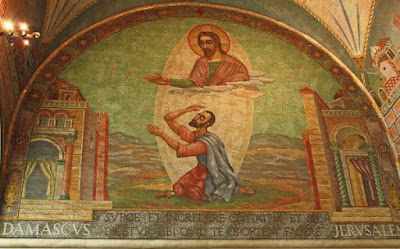Today is the Feast Day of the Conversion of St. Paul. I've just been to lunch-time Mass in UCD. The priest, in his homily, said that God could make the most extraordinary changes in our life. He said that God didn't cancel St. Paul's previous personality, simply took his previously existing gifts and put them to His service.
Since I've started writing this blog post, I've realized that I actually wrote it already, two years ago. At least, I wrote a blog post on the same feast where I said much of what I intended to say here. So I'm just going to paste that in.
The only thing I really had to add is that I realize Groundhog Day, my favourite film of all time, is also the story of a conversion, albeit not a conversion to Christianity. (I've been writing an article about it, so it's been on my mind.)
Here's what I said this time three years ago:
As
I've mentioned before, "the road to Damascus" is one of my favourite
phrases in the whole world. It's up there with "softly falling snow",
"the cold light of day", "down Memory Lane", and other phrases in which I
can lose myself.
I'm
also very interested in conversion. Some years ago an editor from a
publishing house contacted me, suggesting we work on a book proposal for
his editorial board. He was particularly taken with this post, on my idea of a man, and suggested fleshing it out to book length.
I
didn't like that idea. In my work in a university library, I've
recently found myself handling a lot of books about masculinity, and
(even worse) "masculinities". They're the new thing, and they make me
cringe a little. (The men's conference I posted about recently was my little joke.
I think I underplayed the joke as everybody seems to have taken me
seriously.) A blog post about masculinity is one thing. A whole book is a
horrible thought. Feminism and women's studies are bad enough.
Masculinism and men's studies are to be strenuously resisted! (Which is
no criticism of those groups which exist to counter man-bashing in the
media, universities and legal system.)
Anyway,
that's all a digression. I suggested to him instead that we submit a
proposal for a book on conversion, and I did a huge amount of work on
the proposal. But, alas, they didn't think it would sell. (Maybe better,
in the long run. This was a 'progressive' Catholic publisher, which
would have been quite a mismatch.)
There
is something mysterious about conversion, even when it comes to secular
matters. The image of St. Paul dazzled by the light is an appropriate
one. There always seems something irreducible about any conversion,
something that can't be covered by any explanation, something that even
the convert can't fully understand or articulate. One day, perhaps, I
will write that book. In the meantime, I pray to St. Paul for many more
conversions!


